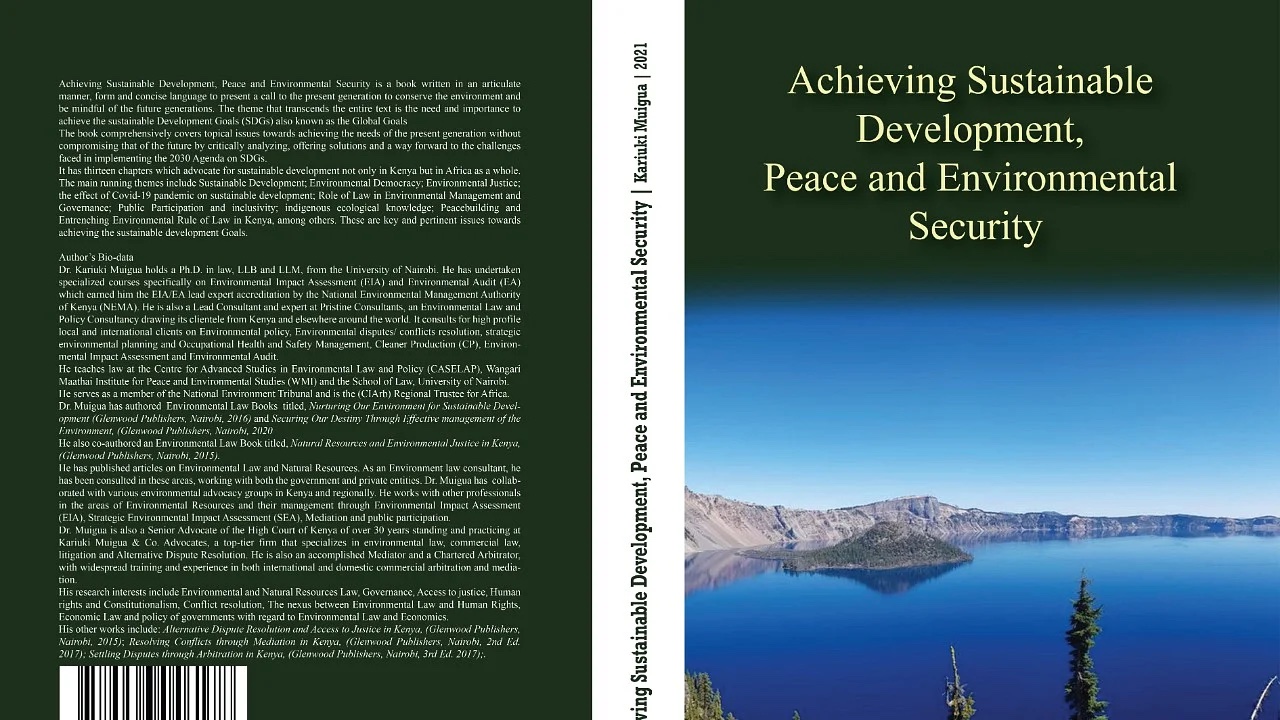Internationally acclaimed lawyer and arbitrator, distinguished law scholar, leading environmental consultant, alternative dispute resolution (ADR) expert and best-selling law books author Dr. Kariuki Muigua, PhD has made a very persuasive and well-argued case why Countries all over the world should adopt progressive laws and policies in fostering realization of sustainable development goals in his latest book: Achieving Sustainable Development, Peace and Environmental Security. Written in an articulate and precise language, the book presents a call for the management of the environment in an effective manner that enhances sustainable development and presents a much needed blueprint for addressing the challenges concerns affecting Kenya, the African Continent and the world at large in fostering achievement of sustainable development.
The book is largely informed by the emerging issues since 2015 when the United Nations Agenda of Sustainable Development Goals (SDGs) was adopted by states around the world. It highlights the challenges faced in implementing the 2030 Agenda on SDGs and offers numerous recommendations on how to address them in thirteen chapters. The main running themes in the book are Sustainable Development; Public Participation, Diversity and Inclusivity; Environmental Democracy; Environmental Justice; Indigenous Ecological Knowledge; Social Justice; Environmental Rights; Role of Law in Environmental Management and Governance; Peacebuilding and Entrenching Environmental Rule of Law. The book links these themes with environmental conservation and management making the case for sustainable development through an integrated approach and realistic progressive laws.
Chapter One is the introductory chapter, explores the link between Sustainable Development, Peace and Environmental Security and calls for the promotion of just, peaceful and inclusive societies for realization of sustainable development. Chapter Two analyses the concept of giving Natural Resources a Legal Personality and the current approaches envisaged in natural resources management in both the international and national laws. It advocates for the striking of balance between ecocentrism/biocentrism and anthropocentrism approaches in environmental & natural resources management and challenges the current approaches (both nationally and internationally) which are largely based on an anthropocentric approach.
Chapter Three interrogates the need to combat Climate change in realizing sustainable development by encouraging adoption of alternative sources of energy towards achievement of Clean and sustainable Energy for all. Chapter Four examines the Sustainable Development Agenda for Poverty Eradication, interrogates both the National and International Legal frameworks on poverty eradication and offers recommendations for ensuring poverty in all its form is in all sections of the society.
Chapter Five discusses the human rights approach to Environmental and Natural Resource Conflicts Management and includes critical analysis of the concepts of conflict management mechanisms and securing Human Rights in relation to environment and Natural Resources. Chapter Six discusses Environmental Democracy, Peace and Sustainable Development and the linkage between peacemaking and environmental management and the role women play in peacemaking and environmental management in Kenya. Chapter Seven delves into the lessons learnt from the Coronavirus (COVID-19) Pandemic and the need for Kenya as a country to consider redefining development in a customized global south perspective.
Chapter Eight interrogates the need to consider a new path for Environmental Management and sustainable development and provides practical recommendations on how Kenya can actualize the current progressive constitutional and statutory provisions in achieving the sustainable development agenda drawing from the international best practices. Chapter Nine discusses how Kenya and the world in general can achieve Sustainable Development Goals and the challenges facing the efforts and offers viable social, economic and political solutions involving the participation of all stakeholders.
Chapter Ten evaluates the African Union Commission’s, Agenda 2063 and Africa’s Regional Development plan against the sustainable development goals agenda and the resource curse phenomenon and Natural Resource-Based conflicts in the African continent and the emerging jurisprudence from the African Court of Justice and Human Rights (the African Court) and the Investment-Related Dispute settlement under the African Continental Free Trade Agreement (AfCFTA).
Chapter Eleven offers a discourse on the need to integrate community practices and cultural voices into the Sustainable Development discourse. Chapter Twelve discusses the link between Sustainable Development and Access to justice. Access to justice is a very important aspect of sustainable development. Chapter Thirteen wraps up the discussion by calling for a participatory and collaborative approach in the realization of the Sustainable Development Goals.
In brief, Dr. Muigua argues that Sustainable Development Goals can only be realized in a peaceful and viable environment. The scholar at Centre for Advanced Studies in Environmental Law and Policy (CASELAP) and the School of Law, University of Nairobi and renowned author who is widely published in the areas of environment and natural resources, ADR and access to justice excels himself in the book in showcasing his rich environmental, legal and dispute resolution knowledge and experience. There is no question that the publication will contribute immensely to the realization of the Sustainable Development Goals. Achieving Sustainable Development, Peace and Environmental Security is definitely a must read for students, teaching fraternity, members of the bar and the bench, legislators, policy makers, environmentalists and the public in general.

- Log in to post comments
